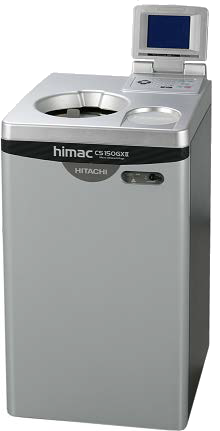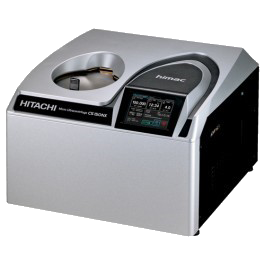Home· · ·Techcomp college· · ·Application notes
Application notes
Himac-Orange 149 –Efficient separation of adenoviruses using multi-step mode – Micro Ultracentrifuge
In 1953, adenoviruses were first isolated in human adenoids (from which the name is derived), and have been widely used ever since. Adenoviruses are known to be medium-sized (90 to 100 nm), nonenveloped icosahedral viruses which composed of a nucleocapsid and a double-stranded linear DNA genome. And the virus is composed of around 1 million amino acid residues and weights around 150 MDa. The technique by adenoviruses to analyze mammalian cells was developed recently. Therefore adenoviruses are now widely used.
A cesium chloride density-gradient sedimentation equilibrium method using a swinging bucket rotor is utilized to refine adenovirus particles.
This method dissolves cesium chloride crystal into a virus suspension to form a solution of homogeneous concentration, centrifuges the solution, and then forms a density gradient solution by centrifugal force. Also called a "self-forming" method, the empty particles of adenoviruses are removed by this method based on difference in the density. The buoyant density of adenovirus particles in the cesium chloride solution are known to be 1.34 g/ml and that of empty particles 1.30 g/ml.
This method must satisfy the following two points:
(1) To get an equilibrium state of the density gradient solution (In case of conventional method, it takes too much time to get an equilibrium state.); and
(2) To keep the separation band of adenovirus particles away from the separation band of the empty virus particles (via the centrifugation at a relatively low speed).
Therefore, in case of the conventional method, adenovirus sample is centrifuged with a relatively low speed and long time by means of a swinging bucket rotor.
Rotor: P55ST2 swinging bucket rotor (5 ml, 6 buckets) or equivalent
Speed: 35,000 rpm (Maximum RCF: 148,000 xg)
Time: 20 hours
According to the investigation by our calculation, it is possible to shorten the separation time by means of a fixed angle rotor for micro ultracentrifuges and the multi-step mode keeping the maintaining a distance between the adenovirus band and the empty virus band, even at higher rotor speed. As the result, this method will be expected to separate adenoviruses by about one-third of the separation time in the conventional method.
Description
Rotor: S110AT fixed angle rotor (5 ml, 8 cavities)
Speed and Time
110,000 rpm: 2.5 hours
90,000 rpm: 1 hour
80,000 rpm: 1 hour
52,000 rpm: 2.5 hours
Temperature: 4°C
Acceleration: 9 (Maximum acceleration)
Deceleration: 7 (Rather slowly)
Tube: 5PA seal tube
Sample preparation
Per one tube (5PA seal tube)
Virus suspension: 4.47 ml (Buffering solution: 10 mM Tris-HCl, pH8.1)
Cesium chloride: 2.36 g
Completely dissolve cesium chloride in the virus suspension and move the solution into each 5PA seal tube. If any tube is not filled with the solution, prepare more solution (by dissolving 1 g of cesium chloride into 1.9 ml of the above buffer solution) and then add it to the tube needing to be filled up.
There are two types of micro ultracentrifuges: the floor-standing type (CS-GXII series: CS150GXII and CS120GXII) and the tabletop type (CS150NX). You can use either type.
Equipment

CS150GXII
Micro Ultracentrifuge

S110AT
Fixed Angle Rotor

CS150NX Tabletop
Micro Ultracentrifuge
Product Info: Himac CS150NX Tabletop Micro Ultracentrifuge
Note: CS-GXII series is old model. Current model is CS150NX, CS150FNX



 2606, 26/F., Tower 1, Ever Gain Plaza, 88 Container Port Road, Kwai Chung, N.T., Hong Kong
2606, 26/F., Tower 1, Ever Gain Plaza, 88 Container Port Road, Kwai Chung, N.T., Hong Kong +852-27519488 / WhatsApp/WeChat HK: +852-8491 7250
+852-27519488 / WhatsApp/WeChat HK: +852-8491 7250 techcomp@techcomp.com.hk
techcomp@techcomp.com.hk
 Sweep The Concern Us
Sweep The Concern Us